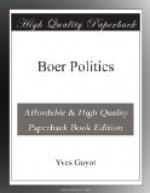There we see a distinct assertion of suzerainty, the question which, according to Dr. Kuyper, was first raised in 1898.
“By the Pretoria Convention of 1881, Her Majesty, as Sovereign of the Transvaal, granted to the inhabitants of this territory complete self-government subject to the suzerainty of Her Majesty; and according to the London Convention of 1884, Her Majesty, while maintaining the preamble to the preceding instrument declared that certain other Articles would be substituted for Articles contained in the Convention of 1881. The Articles of the Convention of 1881 have been accepted by the Volksraad of the Transvaal State and those of the Convention of 1884 by the Volksraad of the South African Republic.
“According to these Conventions Her Majesty’s position towards the South African Republic is that of a suzerain, who has granted to the people of this Republic self-government under certain conditions; and it would be incompatible with this situation to submit to arbitration the meaning of the conditions under which she has granted self-government to the Republic.”
Mr. Chamberlain concluded by saying that he could not admit the intervention of any Foreign power between the English Government and that of the South African Republic, and that, therefore, he could not submit the violations of the Convention of 1884 to the consideration of such a power.
On April 11th, 1898, the new State Secretary, Mr. Reitz, returned to the question in a long despatch described by Dr. Kuyper as “crushing” (foudroyante), and which proves, at least, that the Suzerainty Question had been raised before 1898, since it endeavours to refute Mr. Chamberlain’s despatches of March 6th, and October 16th, 1897.
To this Mr. Chamberlain replies, December 15th, 1898:—
“The preamble to the Convention of 1881 remains the basis of the relations between Her Majesty and the inhabitants of the South African Republic. To these inhabitants Her Majesty guarantees internal independence, to Herself she reserves the Suzerainty. The concession of internal independence and the reservation of the Suzerainty have but one common origin—the preamble to the Convention of 1881.”
Dr. Reitz succeeded Dr. Leyds as Secretary of State, and on May 9th, 1899, replied to the despatch of the preceding December 15th. In forwarding this despatch Sir Alfred Milner observed that it contained a pretension never before put forward by the Government of Pretoria, the following words being used: “the inherent right of a Sovereign International State.”
Mr. Chamberlain replied, July 13th, 1899, summarising the Conventions of 1852, 1881, and 1884; he recalled Lord Derby’s declaration in the House of Lords, March 17th, 1884: “Whatever Suzerainty meant in the Convention of Pretoria, the condition of things which it implies still remains. Though the word is not actually used, we have kept the substance.”




